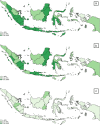Utilization of Postnatal Care Service in Indonesia and its Association with Women's Empowerment: An Analysis of 2017 Indonesian Demographic Health Survey Data
- PMID: 35013886
- PMCID: PMC8747864
- DOI: 10.1007/s10995-021-03324-y
Utilization of Postnatal Care Service in Indonesia and its Association with Women's Empowerment: An Analysis of 2017 Indonesian Demographic Health Survey Data
Abstract
Objective: The coverage of postnatal care (PNC) is among the lowest globally when compared with other maternal and child interventions. This study aims to assess PNC utilisation in Indonesia and its association with women's empowerment indicators to provide evidence for the need for policy change.
Methods: Data from the 2017 Indonesian Demographic Health Surveys was analyzed for any use of PNC, early first PNC (within 2 days of birth) and PNC after discharge for newborns. Women's empowerment factors were calculated using a principal component analysis of 17 indicators. The association between women's empowerment factors and PNC was assessed using logistic regression adjusted for covariates and complex survey design.
Results: The prevalence of any PNC by skilled professionals in Indonesia was high but PNC after discharge was very low. Labor-force participation and women's knowledge level were associated with any PNC, but the association between women's knowledge level and any PNC was modified by place of birth. Disagreement towards justification of wife beating and women's knowledge level were associated with early PNC but the association was modified by place of birth. Decision-making power was also associated with early PNC but modified by infant's gender. Disagreement towards justification of wife beating was negatively associated with PNC after discharge, but the association between decision-making power and PNC after discharge was modified by the infant's size at birth.
Conclusions for practice: PNC coverage after discharge in Indonesia needs improvement. Women's empowerment indicators need to be addressed in improving PNC coverage.
Keywords: Decision making power; Domestic violence; Female labor force participation; Knowledge; Newborn postnatal care; Women’s empowerment.
© 2021. The Author(s), under exclusive licence to Springer Science+Business Media, LLC, part of Springer Nature.
Conflict of interest statement
The authors declare no conflicts of interest.
Figures


Similar articles
-
Women's empowerment and the use of antenatal care services: analysis of demographic health surveys in five Southeast Asian countries.Women Health. 2019 Nov-Dec;59(10):1155-1171. doi: 10.1080/03630242.2019.1593282. Epub 2019 Apr 3. Women Health. 2019. PMID: 30943880
-
The Role of Women's Empowerment in Fertility Preferences and Outcomes: Analysis of the 2017 Indonesia Demographic and Health Survey.BMC Womens Health. 2025 Apr 30;25(1):211. doi: 10.1186/s12905-025-03748-6. BMC Womens Health. 2025. PMID: 40307733 Free PMC article.
-
Women's empowerment is associated with maternal nutrition and low birth weight: evidence from Bangladesh Demographic Health Survey.BMC Womens Health. 2020 May 5;20(1):93. doi: 10.1186/s12905-020-00952-4. BMC Womens Health. 2020. PMID: 32370781 Free PMC article.
-
Reduction of maternal and perinatal mortality in rural and peri-urban settings: what works?Eur J Obstet Gynecol Reprod Biol. 1996 Oct;69(1):47-53. doi: 10.1016/0301-2115(95)02535-9. Eur J Obstet Gynecol Reprod Biol. 1996. PMID: 8909956 Review.
-
Postnatal quality of care measures for mothers and newborns at home: A scoping review.PLOS Glob Public Health. 2024 Aug 20;4(8):e0003498. doi: 10.1371/journal.pgph.0003498. eCollection 2024. PLOS Glob Public Health. 2024. PMID: 39163315 Free PMC article.
Cited by
-
Non-utilisation of postpartum services in northwestern Nigeria: analyses of trend and social determinants from 2003 to 2018.BMJ Open. 2025 Jan 2;15(1):e086121. doi: 10.1136/bmjopen-2024-086121. BMJ Open. 2025. PMID: 39753260 Free PMC article.
-
Factors Associated with Post-Natal Care Utilization among the Women of Reproductive age Group: Evidence from Bangladesh Demographic and Health Survey 2017-18.Health Serv Res Manag Epidemiol. 2022 Nov 7;9:23333928221136393. doi: 10.1177/23333928221136393. eCollection 2022 Jan-Dec. Health Serv Res Manag Epidemiol. 2022. PMID: 36388173 Free PMC article.
-
Early postnatal care contact within 24 hours by skilled providers and its determinants among home deliveries in Myanmar: Further analysis of the Myanmar Demographic and Health Survey 2015-16.PLoS One. 2023 Aug 16;18(8):e0289869. doi: 10.1371/journal.pone.0289869. eCollection 2023. PLoS One. 2023. PMID: 37585471 Free PMC article.
-
Determinants of postnatal care utilization and maternal practices in rural areas of Lao People's Democratic Republic: a community-based cross-sectional study.BMC Pregnancy Childbirth. 2025 Jul 2;25(1):699. doi: 10.1186/s12884-025-07798-4. BMC Pregnancy Childbirth. 2025. PMID: 40604492 Free PMC article.
-
The role of women's empowerment in the uptake of maternal health services in low- and middle-income countries: a propensity score-matched analysis.J Glob Health. 2025 Jun 20;15:04188. doi: 10.7189/jogh.15.04188. J Glob Health. 2025. PMID: 40539944 Free PMC article.
References
-
- Ahmmed F. Women’s empowerment and practice of maternal healthcare facilities in Bangladesh: A trend analysis. Journal of Health Research. 2021 doi: 10.1108/JHR-11-2020-0559. - DOI
-
- Baqui AH, Ahmed S, El Arifeen S, Darmstadt GL, Rosecrans AM, Mannan I, Rahman SM, Begum N, Mahmud ABA, Seraji HR, Williams EK, Winch PJ, Santosham M, Black RE, for the Projahnmo 1 Study Group Effect of timing of first postnatal care home visit on neonatal mortality in Bangladesh: A observational cohort study. BMJ. 2009;339:b2826. doi: 10.1136/bmj.b2826. - DOI - PMC - PubMed
MeSH terms
Grants and funding
LinkOut - more resources
Full Text Sources
Medical

